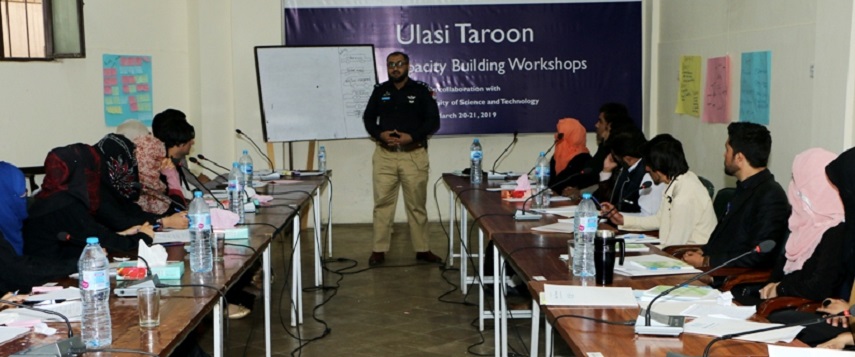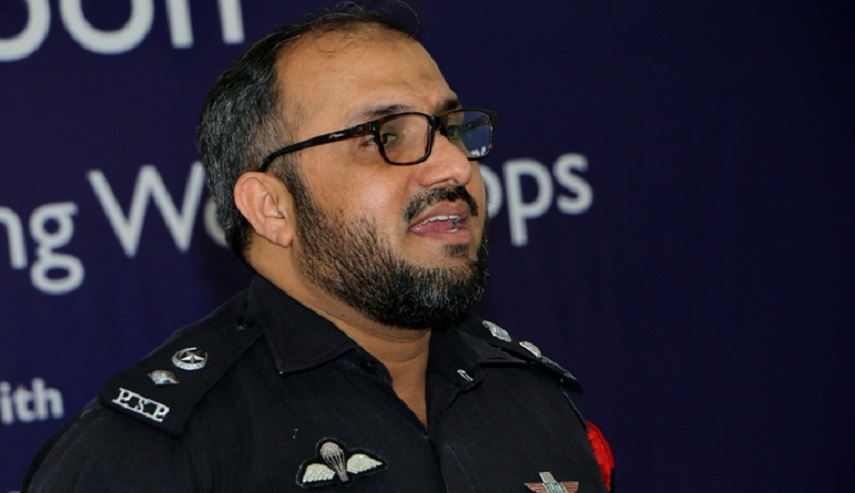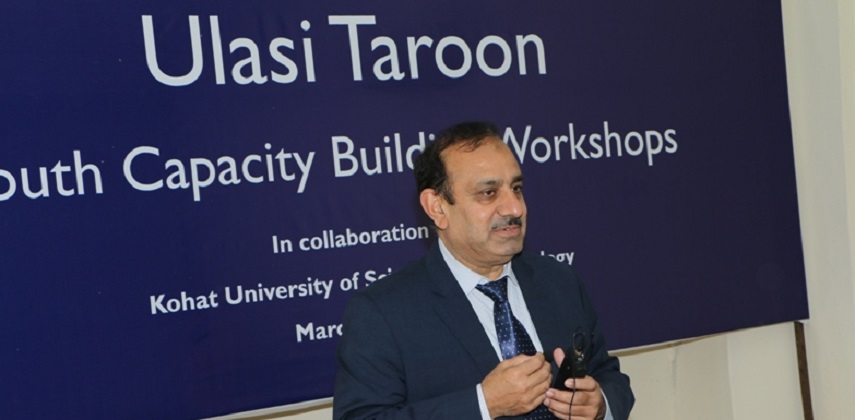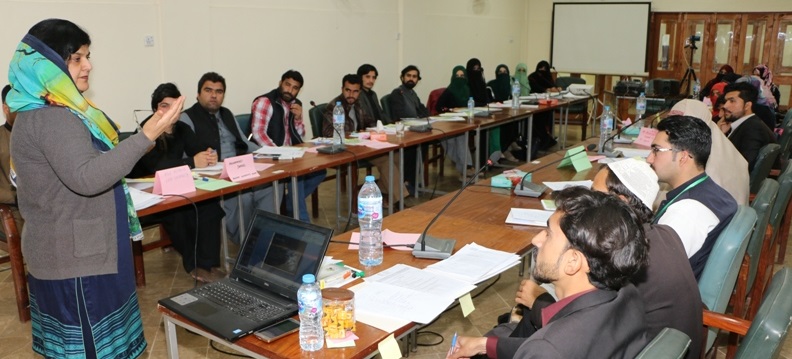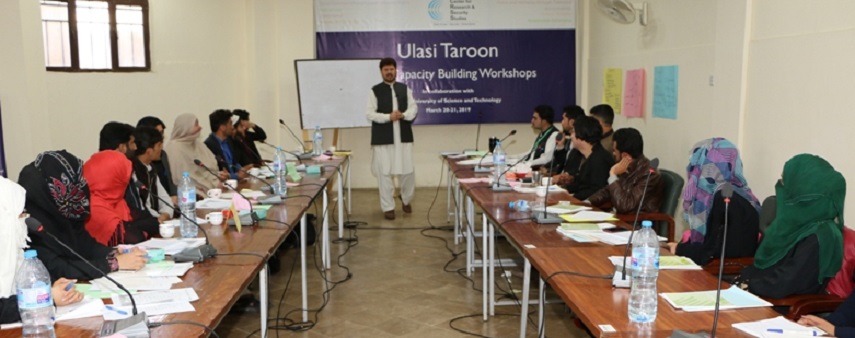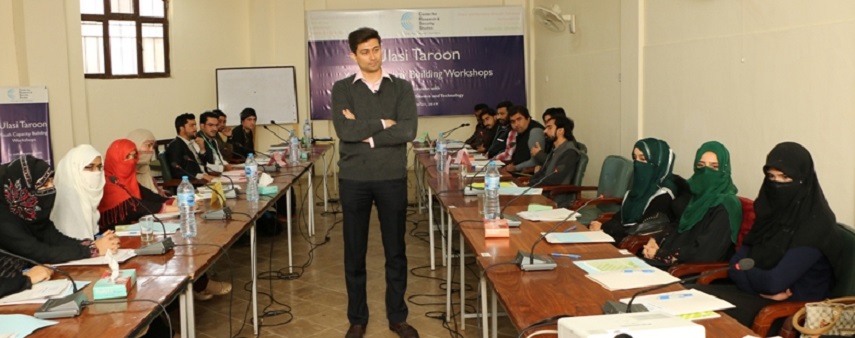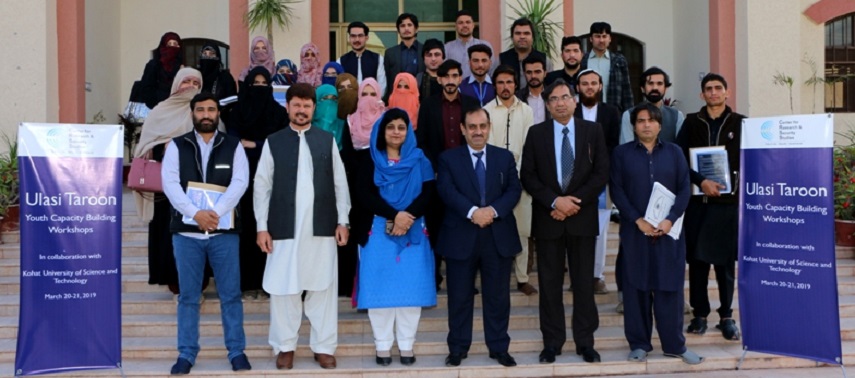The concept of rule of law educates us in the virtues of abiding by the rules and regulations governing the society. It means and hinges on the discipline in the society. Police cannot function properly without public cooperation where it is absolutely essential for effective policing. Rule of law demands responsible citizenship where every member of the society is not only cognizant of but also performs their roles in the community development and peacebuilding processes.
These were the remarks made by Mr. Wahid Mehmood, District Police Officer (DPO), Kohat, during the sixteenth round of Ulasi Taroon, Youth Capacity Building Workshops organized by the Center for Research and Security Studies (CRSS) in collaboration with the Kohat University of Science and Technology (KUST) from March 20-21, 2019.
Mr. Wahid Mehmood emphasized that bridging and fostering public-police gaps and linkages is critical to uphold rule of law and much needed cooperation among the two – through an inclusive partnership – for a crime-free and peaceful society. There is a huge onus on public to responsibly report information about crimes and other activities jeopardizing law and order situation in the society. Only by practicing the ideals of tolerance, acceptance and patience, can responsible citizenship be nurtured. Mastering these ideals can not only make us responsible citizens but also lead to unprecedented success and cohesion in the society.
The DPO Kohat stressed that the youth, in order to achieve success, need to nourish their minds with positivity and gratitude. The cultivation in such ideals is a prerequisite for positive thoughts, words, actions, habits and characters; as the quality of character makes the quality of success in life. He said that the peace lies within patience and tolerance. The highest form of the strength is forgiveness and highest form of the weakness is revengefulness. The real benchmark of success is our ability to respect people regardless of their backgrounds. This will not only ensure inner peace but will also contribute to social peace and harmony. The youth should always be willing to go an extra mile as it is one of the fundamental qualities of leaders.
Dr. Jamil Ahmad Chitrali from University of Peshawar, noted that for an effective democracy, all the democratic institutions should observe their constitutional limits and do not interfere into each other’s domains. In this regard, the legislature, executive and judiciary should only commit to legislation, execution and adjudication respectively. Responsible citizenship requires citizens to be aware of their rights and duties, as well as the role and responsibilities of public representatives. In addition, they should also cast their votes only for the accountable and transparent candidates with the potential to represent the public responsibly and address the issues that concern the public the most. The power of vote can best exercise the accountability. The voters are as much accountable as the representatives. Peace and stability requires strict compliance with and adherence to the core constitutional values and rule of law respectively.
Dr. Jamil Ahmad, Vice Chancellor, Kohat University of Science and Technology (KUST), urged youth to exhibit tolerance and respect for diversity. Misunderstanding of the cultural, traditional, religious and linguistic diversity leads to polarization in the society. Social peace and cohesion demands mutual respect and understanding. Real education means much more than attaining a degree where it requires sensitization in the core constitutional values, rule of law and ethos of social cohesion. Only by adherence to rule of law, can we be successful. He also appreciated the CRSS’s efforts to foster social cohesion and for youth leadership development.
Mrs. Shagufta Khalique, educationist underscored the importance of educating public on the rights and responsibilities anchored in their constitution as well as the international commitments like UDHR. The role of youth in promoting these ideals of equality and tolerance is direly needed. Once the diversity and differences are accepted in a society, the ultimate result is peace. Democracy is also an attitude that needs to be inculcated among youth with practical examples. We must understand that dialogue is the key to resolve the disputes and differences rather than force or coercive means.
Mr. Shams Momand, Project Manager, CRSS spoke about the role of media including broadcast, print and social media to counter radicalization and disseminate the positive messages and tolerance perspectives. It has tremendous outreach key to cultivate the public in the cohesive values. The youth should positively use this platform to spread the messages of peace and harmony.
Mr. Malik Mustafa, Manager Programs, CRSS underscored that the key to social cohesion lies in abiding by the core constitutional values of peace, respect and coexistence enshrined in the constitution. The gratitude and optimism are the virtues that can not only nurture happiness but can also change the way the youth can pursue their visions and achieve success.
Ulasi Taroon is a counter radicalization initiative of CRSS that aims to address the radicalization challenges, extremist ideologies and foster social cohesion through a discourse anchored in the core constitutional values which are fundamentally essential prerequisites for social peace and harmony. The endeavor aims to cultivate and sensitize the youth – in the universities across KP – in the core values in the Pakistani constitution and our social contract. It’s an attempt to highlight the criticality of abiding by these ideals – such as adherence to rule of law, primacy and sanctity of constitution, equal citizenry, responsible citizenship, respect for fundamental human rights, tolerance for diversity and different opinions, inclusive democracy and good governance – as a measure of fostering social cohesion and peaceful co-existence.

